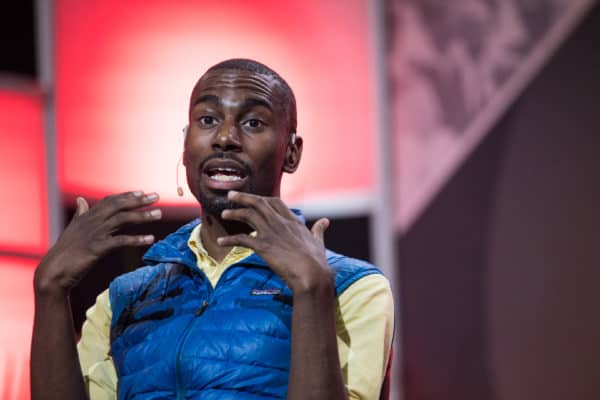Black Lives Matter Cannot be Sued by Louisiana Police Officer, Federal Judge Rules
Derek Hawkins, Washington Post, September 29, 2017

July 24, 2017 – Baltimore, Maryland, United States – DeRay McKesson, Co-Founder Campaign Zero, participated on a panel during the youth and college public mass meeting, during day three of the NAACP’s 108th Annual Convention. (Photo by Cheriss May) (Credit Image: © Cheriss May/NurPhoto via ZUMA Press)
A federal judge ruled Thursday that Black Lives Matter was not an organization but a social movement akin to the tea party or the civil rights movement, and cannot be sued by a Louisiana police officer who was injured at a protest against police brutality last year.
The ruling by U.S. District Judge Brian A. Jackson threw out a lawsuit an officer with the Baton Rouge Police Department filed anonymously against Black Lives Matter and DeRay Mckesson, one of the movement’s leading activists.
“Although many entities have utilized the phrase ‘black lives matter’ in their titles or business designations,” the judge wrote, “’black lives matter’ itself is not an entity of any sort.”
As such, Jackson said, Black Lives Matter cannot be sued “in a similar way that a person cannot plausibly sue other social movements such as the Civil Rights movement, the LGBT rights movement, or the Tea Party movement.”
The officer, identified as John Doe in court documents, claimed in the lawsuit that he was patrolling a Black Lives Matter demonstration in Baton Rouge on July 9, 2016, when someone threw a rock at his head, injuring his teeth and jaw. Mckesson attended the rally, which was held to protest the fatal shooting of Alton Sterling, a black man, by a white police officer.
The officer argued Black Lives Matter was a “national unincorporated association” and called Mckesson its leader and co-founder. He claimed the activists had gathered in Baton Rouge to incite violence against police and that Mckesson was responsible for the actions of the unidentified demonstrator who hurled the rock.
The judge disagreed.
“Plaintiff has pleaded facts that merely demonstrate that Mckesson exercised his constitutional right to association and that he solely engaged in protected speech at the demonstration that took place in Baton Rouge on July 9, 2016,” Jackson wrote.
The judge added that the officer hadn’t cited any evidence showing that Mckesson “exceeded the bounds of protected speech.” Beyond that, Mckesson couldn’t be held liable for others’ actions, he wrote.
{snip}
The officer’s lawsuit, which is still pending, accuses Black Lives Matter, Mckesson and other prominent activists of inciting the violence. They have denied wrongdoing.















